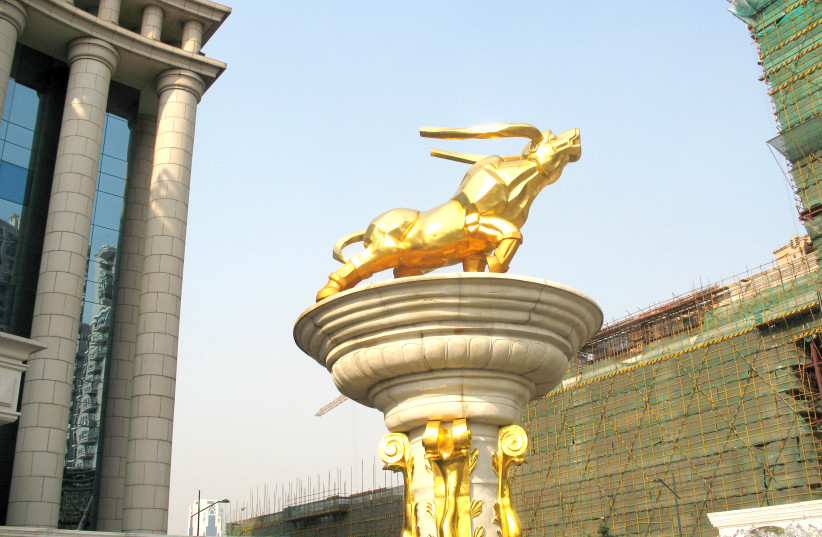Feeling orphaned, insecure and forlorn, the recently freed slaves of Israel demanded of their disappeared liberator’s brother: “Make us a god!” (Exodus 32:1).
Many pens were broken in an attempt to explain how the same people who had just been given the Ten Commandments, while facing a smoking mountain shrouded in thunder and lightning, could so soon afterward turn to worship a golden calf.
Today, as our judges and courts face a reactionary front’s assault, we know the answer: People want a god they can see, and a leader they can worship.
That’s what the Israelites meant when they said of the leader who vanished behind a cloud in the middle of the desert: “That man, Moses, who brought us from the land of Egypt, we do not know what has happened to him.”
They were but a fraction of the millions who, in their quest for certainty, confidence and stability, would confuse human leaders with God.


That is what drives the movement that underpins the anti-judicial front, the movement that is sandwiched between the zealots we visited last week and the separatists we met the previous week: the royalist movement of the Jewish state.
The royalists
Royalists starred in many civil wars, including those of England, France, Russia and Spain, and they had two parts: the elites and the masses.
Having emerged in different lands and eras, the royalist elites were varied, but they had a common denominator: They feared change, they could not bear the king’s diminution, and they had a personal stake in his survival, as the Bolshevik persecution of the tsarist nobility proved.
That’s what happened at the top. Yet all the nobility’s backing alone could not make royalty last if not for what happened at the bottom. Down there, multitudes of impoverished and illiterate subjects sincerely believed that the king was a superior man, divinely chosen to rule over man.
This lie persisted for centuries and only fell apart when royalty became too grotesque to worship and too abusive to bear.
This is also what is at play with Israel’s royalist movement. At its top are ministers, deputy ministers, lawmakers, city councilmen, and a multitude of other beneficiaries of Prime Minister Benjamin Netanyahu’s political handouts. Without his kingship, their titles, salaries, clout, honor and any claim to relevance will vanish.
That is why royalists like Communications Minister Shlomo Karhi or the Prime Minister Office’s Galit Distal Atbaryan compete in delivering preposterous statements. Their role is not to articulate ideas or devise plans, but to applaud the king and parrot whatever he says.
That is also why they detest the court, its judges and their sway. The judiciary’s mere willingness to question their benefactor’s conduct, not to mention its resolve to try the king, threatens these people’s hard-won and little-deserved positions at the heart of the public sphere.
That is not what is happening on the royalist camp’s opposite end.
Down there, in the proletarian realms where Netanyahu’s anti-judicial incitement falls on attentive ears, there is little privilege and much distress. In the shoe-box apartment blocks that checker Israel’s cities and enjoy little of its prosperity, Netanyahu is not the goldmine that he is to his lackeys. Here, he is the golden calf.
That is why these royalists’ anxiety is different from the rest of the anti-judicial front’s fears. Unlike Netanyahu’s cronies, they have no perks to lose; unlike ultra-Orthodoxy’s separatists, they serve in the army; and unlike the anti-judicial zealots, they hardly get to the West Bank and don’t think much about how it is run. What they fear is that the court will smelt their idol.
JUDAISM’S VIEW of royalty is suspicious at best, harsh at worst. The biblical Samuel thought that any king would inevitably be adventurous, abusive and corrupt. The Pharisee rabbis confronted the Hasmonean kings’ attempts to control the priesthood and challenge the judiciary. And Moses did not crown himself, his sons or his successor as kings.
That’s why Moses was so appalled at the sight of the golden calf. Not only did it misinterpret God and His place in the world, but it also distorted human leadership and its place in nationhood, and it misunderstood the law and its place in society.
Having been raised within an imperial palace, where he saw how a king is deified while he crushes thousands, Moses made the appointment of judges compulsory and the crowning of a king voluntary. And if a king is crowned after all, he decreed, the king’s money, army and women should all be limited, all of which added up to the first legal limitation of royal power in history.
It follows, that if Moses had landed in Jerusalem these days and seen his descendants’ leader deride, manipulate and lay siege to the legal system that put him on trial, Moses would detect the golden calf from afar and side with the judges who are ready to call its bluff.
Curiously enough, the meeting between Netanyahu and Moses that such a visitation might create already happened, at least according to one of its participants.
“Facing me right up there in the gallery,” Netanyahu told the US Congress back in 2015, “overlooking all of us in this chamber is the image of Moses,” the one who “led our people from slavery to the gates of the Promised Land,” the leader who “gave us a message that has steeled our resolve for thousands of years… ‘Be strong and resolute, neither fear nor dread them.’”
That’s true, Bibi, but the problem is that Moses spoke not only to you but also to us – and we, unlike you, remember not only what he said about power and resolve but also what he said about justice, its abusers, and their golden calves.
www.MiddleIsrael.net
The writer, a Hartman Institute fellow, is the author of the bestselling Mitzad Ha’ivelet Ha’yehudi (The Jewish March of Folly, Yediot Sefarim, 2019), a revisionist history of the Jewish people’s political leadership.
